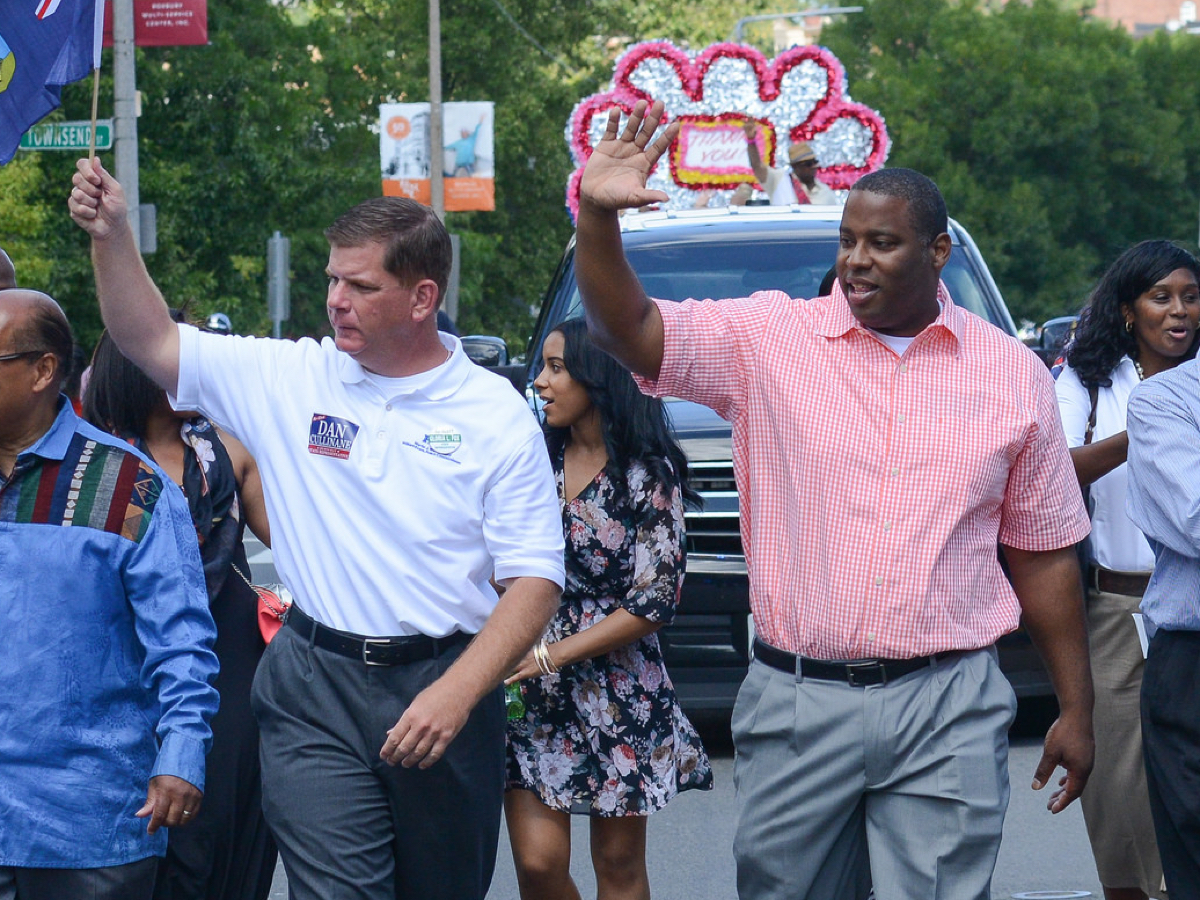Takeaways from Marty Walsh and Tito Jackson’s Town Halls

Photo via Mayor’s Office/Jeremiah Robinson
Marty Walsh may have a big lead in the polling for the ongoing mayoral race, but Tito Jackson says that doesn’t trouble him too much. In a ranging interview with the Boston Globe and WBUR, he pointed to the unlikely success of the low-budget campaign to keep the Olympics out of Boston against the very well-funded effort to bring them here as a sign that the underdog can win.
Both candidates took part in separate hour-long town halls with Meghna Chakrabarti of WBUR and the Globe‘s Meghan E. Irons at UMass Boston, and the subject of the Olympics kerfuffle came up repeatedly. It was the first thing Jackson brought up under his list of achievements, and Walsh dug in on his handling of the situation, refusing to call it a misstep. Though he also expressed a hint of frustration suggesting he was tired of the subject, saying that “in a week, L.A. will get it, and we can stop talking about Boston 2024.” Given Jackson’s apparent pride in his efforts to bring the whole thing down (he had to be reminded that other groups contributed), that seems unlikely.
Jackson also, as the challenger, had a lot of negative things to say about Walsh, while Walsh was more circumspect, rarely mentioning his opponent by name.
Here are the big takeaways from the two interviews.
Tito Jackson
1. The G.E. Deal
Jackson repeatedly criticized the way Governor Charlie Baker and Marty Walsh brought General Electric to the city of Boston, saying “They should not be paid to come to the city” and referencing what he called an “opportunity cost” that sent money to a multi-billion dollar corporation instead of services for the residents of Boston. When pressed about what he would do as mayor if he had to interact with G.E. executives after criticizing them on the campaign trail, he called G.E. “a great addition to the city of Boston,” but questioned, again, at what cost the company had come here.
2. Education funding
The subject of money for public schools came up repeatedly in Jackson’s interview, and he talked about Mayor Walsh inadequately funding public schools and how he would more fully fund them. He also called out the degree to which “wraparound services” were insufficient in the school system, and how more guidance counselors were needed. He was strongly opposed to charter schools, and when it was suggested that some parents really want to send their children to charter schools, he said that was more a reflection of public schools failing them.
3. Affordable housing
It wouldn’t be a discussion about the status of Boston without the topic of housing costs coming up. Though Chakrabarti listed statistics suggesting the city was doing well with the percentage of new housing being built at affordable levels, Jackson disagreed about what makes housing affordable. He thinks the standard should be changed, so that affordable housing is determined by median income in the neighborhood where it’s being built, and he’d like to see the required percentage of affordable housing increase.
Marty Walsh
1. Affordable housing
As expected, Walsh touted his achievements on affordable housing, saying the city has built 19,000 new units in the past 3 years, of which 40 percent could be considered affordable. He also cited a $100 million investment in housing and defined affordable housing as low and moderate income, with families making 0 to 40 thousand dollars a year, and then families making 40 to 100 thousand dollars a year.
2. Economic development
Income disparity came up in both interviews, and Walsh pointed to all the new jobs coming to the city from companies like Reebok, Asics, GE, and Amazon. But he also discussed an innovation lab in Roxbury and a free community college program as a way for people to get a leg up if they’re not the type of worker who can apply to work at Amazon. He also said that income inequality is a nationwide problem, but that in Boston “we’re laying down the foundation” to deal with it.
3. Public safety
The subject of police/community relations came up, with Walsh saying that there’s still fear between the communities and the police officers that patrol them. He said that Commissioner Evans is the first person he talks to every day, and expressed regret that the homicide rate is up in the city, and that even “one is too many.” He said getting guns off the streets was vital, calling gun violence “a national crisis.”
You can watch the full interviews with both candidates below.

